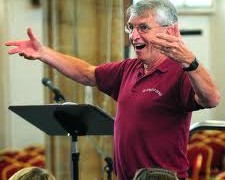Inside tips: How to pass an orchestra audition
mainInternational soloist David Cohen, former principal cello of the Philharmonia Orchestra in London, has seen young musicians arrive time and again for audition high on hope and low on preparation. He offers here, exclusive to Slipped Disc, some useful advice on winning an audition.
How to Prepare and Perform Optimally for Orchestral Audition

My eight years as principal cello of the Philharmonia seem almost a distant cherished memory and yet the nostalgia of hearing my old friends and colleagues perform in the multi medias often brings me back to those wonderful times. Even though my time there was filled with exciting projects with wonderful conductors performing in some of the best venues in the world, there were also some not so glamourous parts of the job that we all were less than looking forward to… this being the bi-annual cello auditions.
I probably sat through more than two dozen auditions in my early years as principal and I quickly realised that 95% of the auditionees did not know how to show themselves in the best light, nor did they seem to understand what we were looking for in order to secure a successful audition which may lead to a successful trial.
Having recently sat through similar type auditions in some of the music colleges in London, it has come to my attention that many young people are not necessarily given enough guidance as to how to prepare and present themselves as well as possible for what most of them will be looking for; an orchestral job in UK.
Now I realise that my own criteria may be focused on the UK orchestral scene, but nevertheless, as UK orchestra players often lead the way around the world as a fine example, I feel that my humble suggestions may be relevant.
The following suggestions may be evident but I would firstly recommend to take a similar approach for an orchestral audition as of a concert recital or concerto.
Concertos-
One is usually asked for the usual suspects such as Haydn C or D Concerto with Cadenza, Dvorak Concerto and often a piece of your own choice. Of course this repertoire may be slightly extended if you audition for a principal chair. It’s important to grab the attention of the panel immediately with a good sound. Your free choice piece should be something that best represents you, something that makes you show off your best qualities. Remember that they are looking for an addition to their section and not another soloist to handle. Although my personal love of Contemporary Music is so strong and involved that I commission at least one new piece every year, for the purpose of orchestral auditions I would recommend staying away from hardcore modern music written in the last 10 years as this could most likely leave the adjudicators feeling restless. I also recommend to stay away from Bach Suites movements, as it is far too personal and everyone has their own (often greatly varied) opinion as to what makes an ideal interpretation.
Your audition starts the moment that you walk in; you are assessed from the moment you enter the room, the way you hold yourself is as important as the way you tune your instrument. Grounded confidence and a serious approach without being too tense goes a long way in your favour.
When performing Haydn and Dvorak Concerti, remember that the jury is made out of cellists who have accompanied the best performances of these pieces by great legends of the cello world and they are not looking for the next Yo-Yo Ma or Steven Isserlis to join their section. Your approach to these pieces as a performance apart from the obvious need to be technically perfect, will show your musical intelligence, your stylistic knowledge and application as well as your ability to cope under pressure – something orchestral musicians need to be able to deliver on a daily basis. So focus on these criterias.
How often have I heard some very fine performances of these concertos during auditions where a young cellist wanted to stand out with their stylistic interpretation which only resulted in some of the panel members comparing these in a negative manner to more traditional approaches. I do not mean to only “play for the jury” exclusively, but you must keep in mind what they are looking for as basic criteria by them listening to your audition.
You will most likely perform these pieces with an official accompanist and may find that due to the short amount of time available to rehearse prior to the audition, there may be some tempo changes which are not what you have agreed to or are used to. This can also be part of the test; your ability to cope and adjust will show the panel your ensemble skills. After all, you are joining a section of at least 11 other cellists and one’s ability to quickly adjust is vital in this world.
Excerpts-
Your excerpts should be prepared as importantly if not more so than your chosen repertoire. One little hint: do some research, as it is most likely you will find recordings of the excerpts you are playing for your audition by the orchestra you are auditioning for and this may give you many clues as to tempos, phrasing and general markings. Each orchestra has its own traditional way of performing these pieces and it would put you ahead of the game to know these and apply them to your performance of the excerpts in the audition.
I remember very well Dudamel on his first contact with the Philharmonia as a young conductor in a masterclass led by Dohnanyi. Dudamel was very much at home with the orchestra and vice versa. Of course talent helps, but he did tell me that he must have listened to just about every single recording the orchestra had made in its history – not bad considering that the Philharmonia is the most recorded orchestra in the world.
Do the markings and bowings that were sent with the excerpts. It is often good to do what is in a part, as these are usually the parts the actual section uses themselves.
Show as much sound quality and articulation differences between the excerpts as possible; Brahms has a certain flavour that is very different to Strauss or Beethoven, for example, and showing these subtle and not so subtle differences will show the panel how aware you are of the stylistic differences.
You may be asked to repeat one of these excerpts with some feed back from the panel, listen carefully and apply it as much as possible, this is more vital than you may think.
Sight-reading-
Sight-reading in the UK orchestral scene will be inevitable, I remember my audition sight-reading for the Philharmonia was horrendously difficult. The page was black with notes and markings and all I remember is feeling a little shell-shocked afterwards, but here are a few useful hints which helped me get through it, because, yes, it is all about getting through it without stopping.
Firstly take some time to just read the music in your head. Read the tempo markings or any other informations that may be written at the beginning of the piece, as well as any tempo changes. I know it may seem obvious, but you would be surprised at the number of auditionees that failed to read the tempo marking and started to play twice as fast as written, partly fuelled by nerves.
The metronome can be a very useful friend to have during your preparation if your inner pulse is not strong enough! Use it properly, as it is not there to just keep you company. It can be one of the most important tools to prepare for your audition as the panel will be looking at rhythm and tempos and these are some of the most important things to ace.
Read all the dynamics carefully, read all the articulation markings, watch for key changes, watch for tempo changes or speed related markings such as rubatos, ritenutos, stringendos, etc. Make mental notes of each of these, visualise and map out in your head the dangerous areas.
Take your time, breathe and remember the tempo, once you start make sure you don’t rush, stick to your pulse… not heart beat pulse as it may go too fast under pressure, but your mental pulse!
After having played it once through, you may be given the opportunity to play it again with some pointers from the jury. If so, listen to them carefully. If you are not sure that you understood, ask them politely to expand and do your best to take things on board. This is one of the most important things for your audition, taking things on board. It will show your ability to adjust your playing freely and quickly.
If sight reading is not your strength, practice it daily, it is a skill that can be learned. I have fond memories while I was at the GSMD of Sundays spent sight reading dozens of quartets, trios, quintets with David Takeno at his house, something I have always encouraged my own cello students to do on a regular basis. The most important thing to remember with this practice is to not rehearse and never stop! It is about getting through as much information as possible in a performance type situation and apply it to your playing.
What not to do-
Should your audition go well and you arrive at the sight-reading and somehow feel a moment of panic; calm down, breathe, take a minute and have a go, we are all human and so is the panel of cellists listening to you, remember this! You may want to follow on the traditional advice of trying to imagine the jury naked on the toilet… but this might make you laugh more than anything else, which may have a counter productive result to your attempt.
As long as you don’t do what a mysterious young French cellist did during his Philharmonia audition: after performing a flawless Dvorak, Haydn and some very good excerpts, I proceeded to ask him if he would mind now doing the sight-reading that was on the stand.
His reply, as he stood up and made his way out slowly, was, ” Alas “… That was it, we never saw him again.
What to do-
This is a job interview as well as an artistic performance and you will be assessed for your performance presentation and the manner in which you also present yourself as a person. Remember, these are the potential colleagues together with whom you will be sharing a lot of your daily time. I know it sounds cliche but, “Be yourself”, as long as it is the, “Be yourself… on good behaviour version”.
I recommend paying extra attention to your excerpts, special attention to rhythm, intonation, dynamics and style. Also, recording one’s self and pretending to be your own judge whilst listening back may illuminate certain areas of your playing that you had over looked. This will help you to hear where you are doing things you didn’t realise you were doing or mean to do, and alternatively, you will also hear where you thought you were doing something but it just didn’t come through enough.
One last thing: should you be one of the lucky ones to recognise the sight reading you are asked to do having recently played it, and thus successfully performing it should you be asked during the audition process how you feel the sight reading went, don’t be holier than the Pope by admitting that you know it and have recently played it.
My conclusions are: be smart, prepare well and present yourself in the best light, but do your home work diligently! Remember that orchestral work – chamber or symphony – is like doing chamber music at the highest level with a slightly larger group of people, so show your abilities to adapt, to take on feed back and show you can bring something to an already well established section. Good luck!






Comments